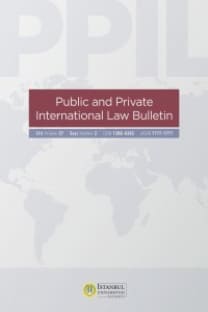Uluslararası İnsan Hakları Hukukuna Postkolonyal Yaklaşımlar: TWAIL Örneği
Postkolonyalizm, Uluslararası İnsan Hakları Hukuku, Üçüncü Dünya, Evrenselcilik, Avrupamerkezcilik
Postcolonial Approaches to International Human Rights Law: The TWAIL Case
___
- Anghie A, ‘Francisco de Vitoria and the Colonial Origins of International Law’ in Eve Darian-Smith and Peter Fitzpatrick (eds), Laws of the Postcolonial (University of Michigan Press 1999). google scholar
- Anghie A, Imperialism, Sovereignty and the Making of International Law, (Cambridge University Press 2005). google scholar
- Anghie A, ‘The Evolution of International Law: Colonial and Postcolonial Realities’ (2006) 27(5) Third World Quarterly 739-753. google scholar
- Bianchi A, International Law Theories: An Inquiry into Different Ways of Thinking (Oxford University Press 2016). google scholar
- Chimni BS, ‘Third World Approaches to International Law: A Manifesto’ (2006) 8(1) International Community Law Review 3-27. google scholar
- Chimni BS, ‘The World of TWAIL: Introduction to the Special Issue’ (2011) 3(1) Trade Law and Development 14 3-27. google scholar
- Chimni BS, International Law and World Order: A Critique of Contemporary Approaches (2nd edn, Cambridge University Press 2017). google scholar
- Eslava L and Pahuja S, ‘Between Resistance and Reform: TWAIL and the Universality of International Law’ (2011) 3(1) Trade, Law and Development 103-130. google scholar
- Fagbongbe M, ‘The Future of Women’s Rights from a TWAIL Perspective’ (2008) 10(4) International Community Law Review 401-409. google scholar
- Gathii JT, ‘TWAIL: A Brief History of its Origins, its Decentralized Network, and a Tentative Bibliography’ (2011) 3(1) Trade, Law and Development 26-64. google scholar
- Moore-Gilbert B, Postcolonial Theory: Contexts, Practices, Politics (Verso 1997). google scholar
- Mutua M and Anghie A, ‘What is TWAIL?’ (2000) 94 Proceedings of the Annual Meeting 31-40. google scholar
- Mutua M, ‘Savages, Victims, and Saviours: The Metaphor of Human Rights’ (2001) 42(1) Harvard International Law Journal 201-245. google scholar
- Mutua M, Human Rights: A Political & Cultural Critique (University of Pennsylvania Press 2002). google scholar
- Mutua M, ‘Standard Setting in Human Rights: Critique and Prognosis’ (2007) 29(3) Human Rights Quarterly 547-630. google scholar
- Nesiah V, ‘The Rise and the Fall of Human Rights Empire’ (Foreign Policy in Focus, June 28 2012) https://fpif.org/the_rise_and_fall_of_the_human_rights_empire/ Date Accessed 10 October 2021. google scholar
- Okafor OC, ‘Newness, Imperialism, and International Legal Reform in Our Time: A Twail Perspective’ (2005) 43 (1/2) Osgoode Hall Law Journal 171-191. google scholar
- Otto D, ‘Rethinking Universals: Opening Transformative Possibilities in International Human Rights Law’ (1997) 18 Australian Year Book of International Law 1-36. google scholar
- Pluckrose H and Lindsay J, Cynical Theories: How Activist Scholarship Made Everything about Race, Gender, and Identity-and Why This Harms Everybody (Pitchstone Publishing 2020). google scholar
- Rajagopal B, International Law from Below: Development, Social Movements and Third World Resistance (Cambridge University Press 2003). google scholar
- ISSN: 2651-5377
- Yayın Aralığı: Yılda 2 Sayı
- Başlangıç: 1981
- Yayıncı: İstanbul Üniversitesi
Güncel Bir Yargı Kararı Işığında Tahkim Iradesi ve Yorumu
Evlenme Yoluyla Türk Vatandaşlığının Kazanılmasında İdarenin Takdir Yetkisi
Uluslararası İnsan Hakları Hukukuna Postkolonyal Yaklaşımlar: TWAIL Örneği
Non-Refoulement İlkesinin Avrupa İnsan Hakları Sözleşmesi Çerçevesinde Uygulanması
Hümeyra Zeynep NALÇACIOĞLU ERDEN
Yurt Dışı Hizmet Akitlerinde Uygulanacak Hukuk
Uluslararası Hukukta Ekonomik Yaptırımların Hukuka Uygunluğu ve Etkinliği Sorunu
